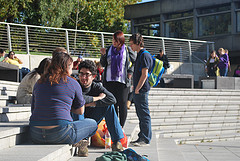 The human memory is very susceptible to the social influence: people share stories, narratives, and this transmission can affect the memory that we have of those stories… even if they are our own stories. An article published in the journal Science shows how the opinions of others can alter the memory that we have of an event, even when these opinions are false.
The human memory is very susceptible to the social influence: people share stories, narratives, and this transmission can affect the memory that we have of those stories… even if they are our own stories. An article published in the journal Science shows how the opinions of others can alter the memory that we have of an event, even when these opinions are false.
The subject of the experiment (30 adults) saw a video of an arrest by police in groups of five. Three days later, the subjects returned to the laboratory to carry out a memory test on the video. Four days after the test, the subjects returned back to the lab to answer a series of questions about the video, while they were examined with a brain scan.
And here is the crux of the experiment. The subjects were shown other answers to those same questions, making them believe that they had been provided by other subjects. The reality is that the answers were false: they had been manipulated by the researchers from correct answers that other subjects had provided. With the knowledge of these false answers, approximately 70% of the subjects gave a wrong answer to the questions.
To check if the memory that the subjects had of the story had actually been amended by the social influence, the researchers did another test: explained to the subject that the answers that they had been shown were not of their peers, but that they had been produced by a computer. Then subjected again to the subject to a test of memory: although there were subjects who gave different responses in the test, more than 40% of the subjects continued to provide wrong answers, based on the responses manipulated to which they were subjected in the first test.
The experiment is interesting because although it was already known that the memory could be affected by social influence, this work shows that the memory of a phenomenon can be altered in a short space of time (4 days).
But not only is it interesting for this reason: by the test of functional magnetic resonance imaging (fMRI), the researchers were able to determine what was the mechanism in the brain that cause this phenomenon. They observed a strong combined activation of two brain areas: the hippocampus, associated with long-term memory, and the amygdala, associated with emotions.
Although as demonstrated in the work the influence social can have a harmful influence on our memories, researchers find a sense to this effect of the conformity of memory (“memory conformity”):
[…] memory conformity may also serve an adaptive purpose, because social learning is often more efficient and accurate than individual learning. For this reason, humans may be predisposed to trust the judgment of the group, even when it stands in opposition to their own original beliefs.
In my opinion, results of studies like this can help us to determine those situations in which the exchange of knowledge can be affected by social interaction, and the manner in which the intelligence of the crowds can be harmed.
